Venue Selection Criteria: Key Considerations for Seamless Events
Updated On: November 12, 2025 by Aaron Connolly
Venue Selection Criteria Essentials
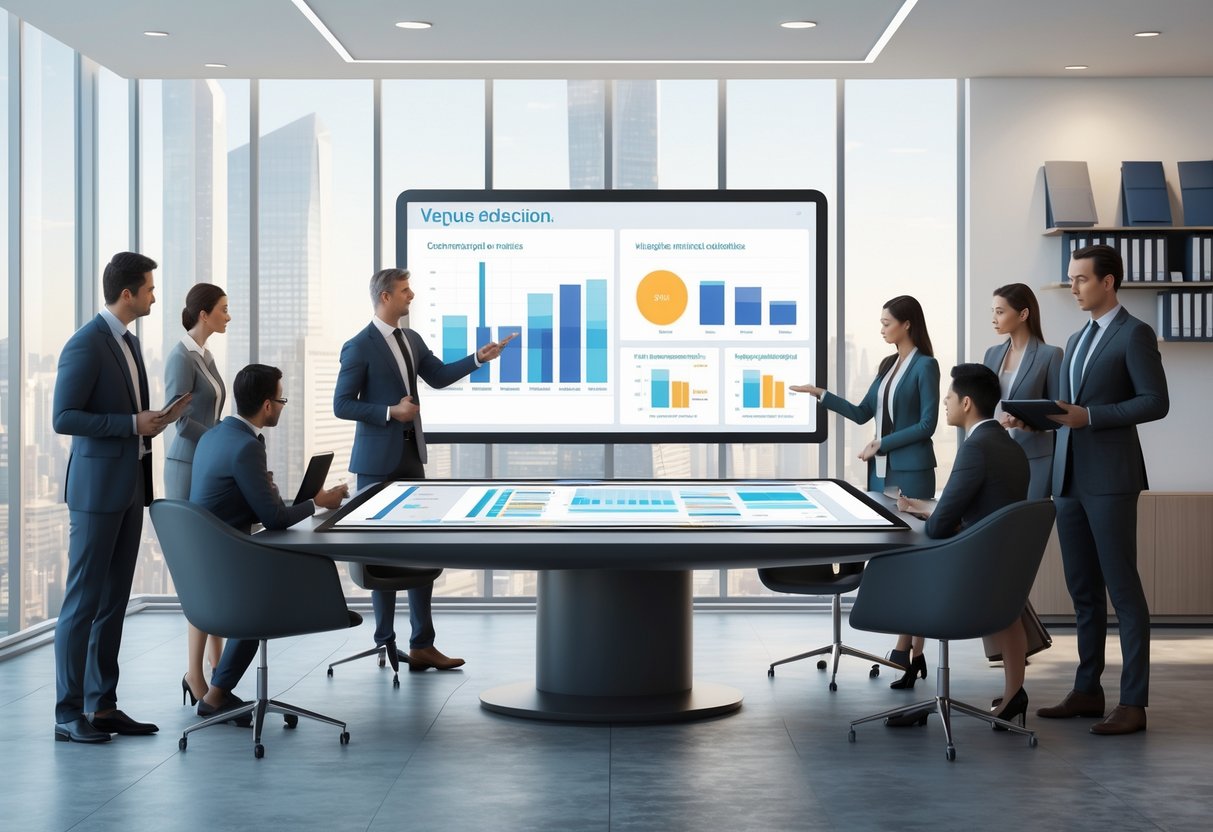
Before we even start venue hunting, let’s pin down what actually makes a venue work for our event. The trick is matching the venue to our event’s purpose, picking a space that fits our needs, and making sure stakeholders won’t be disappointed.
Purpose and Event Goals
Every event begins with a reason. Are we planning a corporate conference or a private celebration? The venue should help us reach our main objectives.
For corporate events, we often focus on networking, education, or brand building. If it’s a tech conference, we need solid Wi-Fi and up-to-date AV gear. Planning a retreat? We’ll want breakout spaces for team activities.
Private events—think weddings or milestone birthdays—are all about atmosphere and guest comfort. The right ambiance helps us create memories that stick.
We should nail down our event goals early:
- Networking events: Open layouts, spots for side conversations
- Educational seminars: Theatre seating, clear sightlines
- Product launches: Flexible layouts for demos
- Award ceremonies: Formal settings, built-in staging
Location plays a huge role in attendance. For local events, people want easy access from home or work. If we’re inviting folks from out of town, they’ll care more about how close the venue is to airports or hotels.
Our choice of venue says a lot about how seriously we take the event.
Matching Venue to Event Type
Different event types need different features. We can’t just throw a gala in a warehouse unless we’re ready to spend big on decor and lighting.
Conference venues should offer:
- Several breakout rooms
- Reliable internet
- Built-in AV
- Registration zones
Workshop spaces work best with:
- Flexible furniture
- Good lighting
- Wall space for displays
- Easy-to-reach storage
Social gatherings thrive with:
- Kitchens or catering partners
- Dance floors or entertainment areas
- Bar setups
- Comfy seating
Exhibitions call for:
- High ceilings
- Loading docks
- Plenty of outlets
- Climate control
Capacity matters—a lot. If we try to squeeze 500 people into a space for 250, it’s going to be a mess. On the flip side, 50 people rattling around a huge hall feels weird and impersonal.
The venue’s style should match our vibe. Corporate events fit well in conference centers or hotels. Creative workshops? Maybe an art gallery or a modern co-working spot.
Stakeholder Expectations
Our venue decision affects a bunch of different people, and everyone’s got their own priorities.
Attendees want:
- Easy parking or transport
- Accessible facilities
- Comfortable temps and decent acoustics
- Clean, safe spaces
Speakers and presenters look for:
- Dependable tech
- Prep rooms or green rooms
- Good lighting on stage
- Helpful staff
Sponsors and partners hope for:
- Great branding spots
- Quality facilities that make them look good
- Networking areas
- Professional event management
Our team needs:
- Time and space for setup and breakdown
- Storage for supplies
- Responsive venue support
- Clear contracts with some wiggle room
Budget is always a factor for everyone. We need upfront pricing that covers all possible fees. Venues often tack on charges for Wi-Fi, extra hours, or cleaning.
Key budget items:
- Base rental
- Catering minimums
- Equipment hire
- Parking
- Insurance
We should collect input from all stakeholders before we even visit venues. It saves us from expensive changes and helps us find a place that works for everyone.
Staying in touch with venue managers clears up what’s included and what’s extra. That helps us budget properly and sidestep any nasty surprises.
Budget and Cost Considerations

Figuring out venue costs early saves us from unpleasant financial surprises later. Most venues charge a base fee, but extra costs can sneak up fast if we don’t read the fine print.
Venue Hire Fees
The basic hire fee usually takes the biggest chunk of our venue budget. Rates range from £500 to £15,000 depending on location, size, and how fancy the place is.
Urban venues almost always cost more than rural ones. If we’re booking in December or during summer, expect prices to jump by 30-50%.
Daily vs hourly rates can be tricky. Some venues charge a flat daily rate, even if we’re not there all day. Hourly pricing might look cheaper, but it adds up fast for longer events.
Minimum spend requirements are common, especially at hotels or restaurants. We might have to pay a £3,000 minimum even if our food and drinks bill is only £2,200.
We really should get quotes from at least three similar venues. That gives us bargaining power and a sense of what’s fair for our area.
Hidden and Extra Charges
Venues love to quote a low base rate and then pile on extra charges. Sometimes, these extras can double what we thought we’d spend.
Watch out for these extra fees:
- Service charges (10-20%)
- Cleaning (£100-£500)
- Security deposits (£500-£2,000)
- Equipment hire (£50-£200 per item)
- Overtime staff (£25-£40 per hour)
Tech needs can get pricey. Basic lighting might be included, but if we want AV, streaming, or fancy stage lights, that’s another £500-£2,000.
We should always ask for an all-in quote that lists every possible charge. It’s smart to ask about cancellation fees, damage policies, and weather-related costs if we’re outside.
Value for Money
The cheapest venue usually isn’t the best deal. We focus on what’s included versus what’s extra to find the real value.
Good-value venues often include:
- Basic furniture and lighting
- Sound system and mics
- On-site coordinator
- Cleaning and security
- Parking
We compare venues by cost per attendee instead of just the total. A £5,000 venue for 200 people (£25 each) is better value than a £3,000 venue for 100 (£30 each).
Location counts too. A central venue might cost more, but if it saves guests money on taxis or hotels, it could be worth it.
Heads up: Super cheap venues might skip insurance, safety checks, or backup power. Saving money there isn’t worth risking the whole event.
Capacity and Space Requirements
If we get the capacity wrong, the event could flop. We need enough space for comfortable movement, the right vibe, and to stick to safety rules.
Calculating Attendee Numbers
Let’s start with realistic numbers—not just wishful thinking. We can check registration data, look at past events, and see what’s normal in the industry.
Registration vs. Actual Attendance
- Corporate: 85-90% show up
- Free events: 60-70% make it
- Paid events: 90-95% attendance
Different attendees need different space. VIPs like more room, speakers need backstage, and staff need work areas that don’t get in the way.
Season and timing matter. December events can be quieter because of holidays. Monday mornings see more no-shows than afternoon slots.
Add a 10-15% buffer for last-minute guests or plus-ones. It’s always easier to close off space than to scramble for more.
Room Size and Flow
Square footage per person changes with the event:
- Reception: 6-8 sq ft each
- Theatre: 8-10 sq ft each
- Banquet: 12-15 sq ft each
- Classroom: 15-20 sq ft each
We need to think past just fitting everyone in. High-traffic spots like registration or bars need extra room. Those areas can get crowded fast.
Mapping out the event flow before booking helps. Where do people enter? How do they move between main activities? Seating should match our goals—rounds for chatting, theatre for talks.
Wide aisles and clear sightlines keep people comfortable. No one likes having to climb over chairs or straining to see the stage.
Legal and Safety Limits
Fire codes set the max number of people, no matter what we think. These aren’t up for negotiation. Venues should show us their official capacity certificates.
We have to keep emergency exits clear and easy to reach. Wheelchair access is a must—usually 1-2% of guests need it.
Insurance might require a certain amount of space per person. Some venues won’t book us unless we have liability coverage that matches their capacity rules.
Local councils sometimes need us to get special permits for big events. These can take weeks, so we should check early.
Staff and vendors need space too. Caterers, AV folks, and security can’t do their jobs if they’re squeezed in.
Location and Accessibility
Where we hold our event makes a huge difference in who shows up and how they feel about it. We need to think about transport links, accessibility, and local amenities for both corporate and private events.
Transport Links and Parking
Public transport can make or break attendance. We should look for venues near train stations, bus stops, or the tube.
Check how often trains and buses run during event hours. Weekends often have fewer options.
For corporate events, venues near business districts make it easier for staff to attend without extra travel.
Parking is a big deal in city centers. We usually need one parking spot for every four guests.
Look for:
- Accessible parking close to the entrance
- Clear signs for parking areas
- Fair parking fees or validation
For big events, coach access matters. Can the venue handle several coaches at once?
Accessibility Features
Accessibility isn’t optional—it’s a must for inclusive events. We want everyone to be able to join in, no matter their needs.
Physical access essentials:
- Wheelchair-friendly entrances (ramps or lifts)
- Wide doors (at least 32 inches)
- Accessible toilets with grab rails
- Step-free access everywhere
Sensory access is important too. We should look for:
- Hearing loops for talks
- Good lighting
- Clear, high-contrast signage
Many venues offer assistive listening devices and can arrange BSL interpreters if we ask ahead.
Check the lifts and their backup plans. A broken lift can ruin the day for wheelchair users.
Local Amenities
Local amenities can really boost the event experience and solve problems for guests. We should check what’s nearby.
Accommodation is key for multi-day events or guests traveling from afar. Hotels at different price points within 15 minutes are ideal.
Nearby dining gives guests options beyond venue catering. It’s especially handy for private events with lots of dietary needs.
Other handy amenities:
- Cash machines for paid events
- Pharmacies for emergencies
- Petrol stations for drivers
- Shops for last-minute needs
We should consider the area’s reputation and safety, especially at night. Well-lit streets and regular public transport make people feel safer.
Wi-Fi in the area is almost essential now. Guests need it for directions, social media, or work during breaks.
Venue Style and Ambience
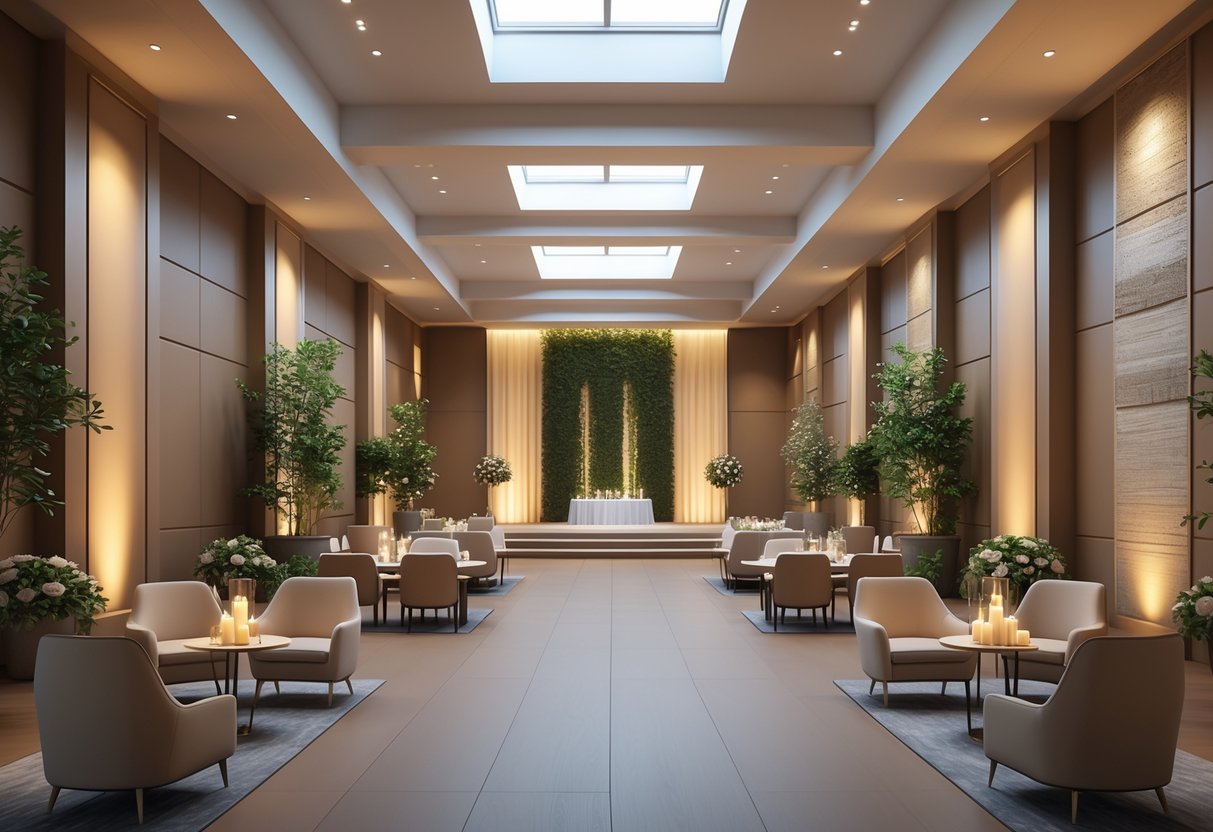
The look and feel of our venue set the tone and create those first impressions that stick. Style choices shape how people remember the event—and honestly, they can make or break the whole experience.
Aligning Style with Event Theme
You want the venue’s architectural design and interior style to fit your event’s purpose and crowd. A formal corporate conference just feels off in the same space as a laid-back gaming tournament or product launch.
For esports events, pick venues with modern, tech-forward designs that actually speak to gamers. Industrial spaces with exposed brick, cool lighting, and sleek finishes usually create the right vibe for competitive gaming.
Traditional ballrooms fit formal award ceremonies best. Warehouse spaces with high ceilings let you set up big screens and handle loud crowds. Outdoor venues can be great for casual community tournaments, though they might throw you some technical curveballs.
Always visit possible venues during lighting conditions similar to your event. Natural light changes a lot during the day, and artificial lighting can totally transform how a space feels.
Key style considerations:
- Architectural period and design elements
- Colour schemes and wall treatments
- Flooring materials and condition
- Window placement and size
- Ceiling height and structure
Atmosphere and Décor
The venue’s existing atmosphere should help your event goals, not fight against them. Some spaces come packed with character, which can boost certain events but limit your flexibility for others.
Lighting control is a big deal when you’re setting a mood. Venues with dimmer switches, coloured lighting, or room for extra equipment let you get creative.
Acoustic properties really matter for the atmosphere. Hard surfaces bring energy but can mess with sound clarity. Carpeted spaces absorb noise but sometimes feel too quiet for high-energy crowds.
Background noise from traffic, AC units, or nearby events can throw off your plans. Test the noise levels at different times if you can.
Décor flexibility is a must for private or branded events. Some venues limit decorations or tack on extra fees for changes. Others have built-in décor that might not work with your theme.
Essential atmosphere checks:
- Sound quality and echo
- Temperature control effectiveness
- Scent and air quality
- Privacy from other events
- Flexibility for custom decorations
Branding Opportunities
Your venue choice becomes part of your brand story and all your marketing. The space should back up your organisation’s image and values while giving you solid branding opportunities.
Look for venues with neutral backgrounds that won’t fight your branding. White or light walls are best for projection and photos. Dark venues can look dramatic but might hide branded materials.
Digital display capabilities are crucial now. Check for built-in screens, projection surfaces, and plenty of power outlets for extra displays. More venues offer LED walls or smart lighting systems these days.
Think about photo ops around the space. Guests love sharing pics on social media, so good backdrops and lighting help your event reach more people.
Signage placement options should be obvious and plentiful. Venues with multiple entrances, lobbies, and hallways give you more spots to reinforce your brand.
Practical branding elements to evaluate:
- Wall space for banners and signs
- Power outlets for digital displays
- Internet connectivity for live streaming
- Stage or focal point areas
- Entrance and registration spaces
Some venues bundle basic branding in their packages. Others charge separately for every change you make.
Venue Layout and Flexibility
The way you set up your venue shapes how smoothly things go and how comfortable guests feel. A smart layout keeps traffic moving, and flexible seating lets you switch things up for different activities.
Floor Plans and Flow
Traffic patterns can make or break how people feel at your event. Study the venue’s floor plan and spot any bottlenecks near entrances, registration, or food stations.
Wide corridors should link main areas so guests don’t get crammed together. Venues with several entry points help avoid crowding when everyone arrives at once.
Strategic placement of key areas really matters. Keep registration near the main entrance but not right in the middle of networking spots. Place catering around the edges so central activities aren’t interrupted.
Ask venue staff about maximum occupancy limits for every room. Some spaces feel perfect for 100 people but get way too crowded if you add just 20 more.
Think about how people will move as your event changes. A venue that’s perfect for an opening presentation can turn chaotic during networking if paths aren’t clear.
Seating Options
Multiple arrangements let you match seating to your event’s needs. Theatre-style is great for presentations. Round tables work better for networking and conversation.
| Seating Style | Best For | Capacity Impact |
|---|---|---|
| Theatre | Presentations, speeches | Highest capacity |
| Classroom | Training, note-taking | Medium capacity |
| Rounds | Networking, dining | Lower capacity |
| U-shape | Small groups, interaction | Lowest capacity |
Moveable furniture lets you change things up as needed. Venues with lightweight chairs and folding tables give you more creative freedom.
Check if the venue charges extra to rearrange furniture. Some include basic setup in the rental. Others bill you by the hour for staff time.
Accessibility requirements should always be part of your seating plan. Make sure wheelchair-accessible spaces blend in naturally, not just stuck off to the side.
Breakout Spaces
Separate areas for small discussions keep your main event from getting noisy or overcrowded. Look for venues with dedicated breakout rooms or quiet zones nearby.
Privacy levels can vary a lot. Glass-walled rooms give visual separation but not much sound isolation. Fully separate rooms offer real privacy for confidential chats.
Technical capabilities in breakout spaces often get ignored during venue tours. Make sure smaller rooms have enough power outlets, Wi-Fi, and basic AV gear.
Proximity to main areas affects how easily people can switch between activities. Breakout spaces should be close enough to access quickly, but far enough to cut down on noise.
Natural lighting and good ventilation in smaller rooms make a big difference. Windowless rooms can get stuffy, especially with a big group packed inside.
Catering Options and Policies
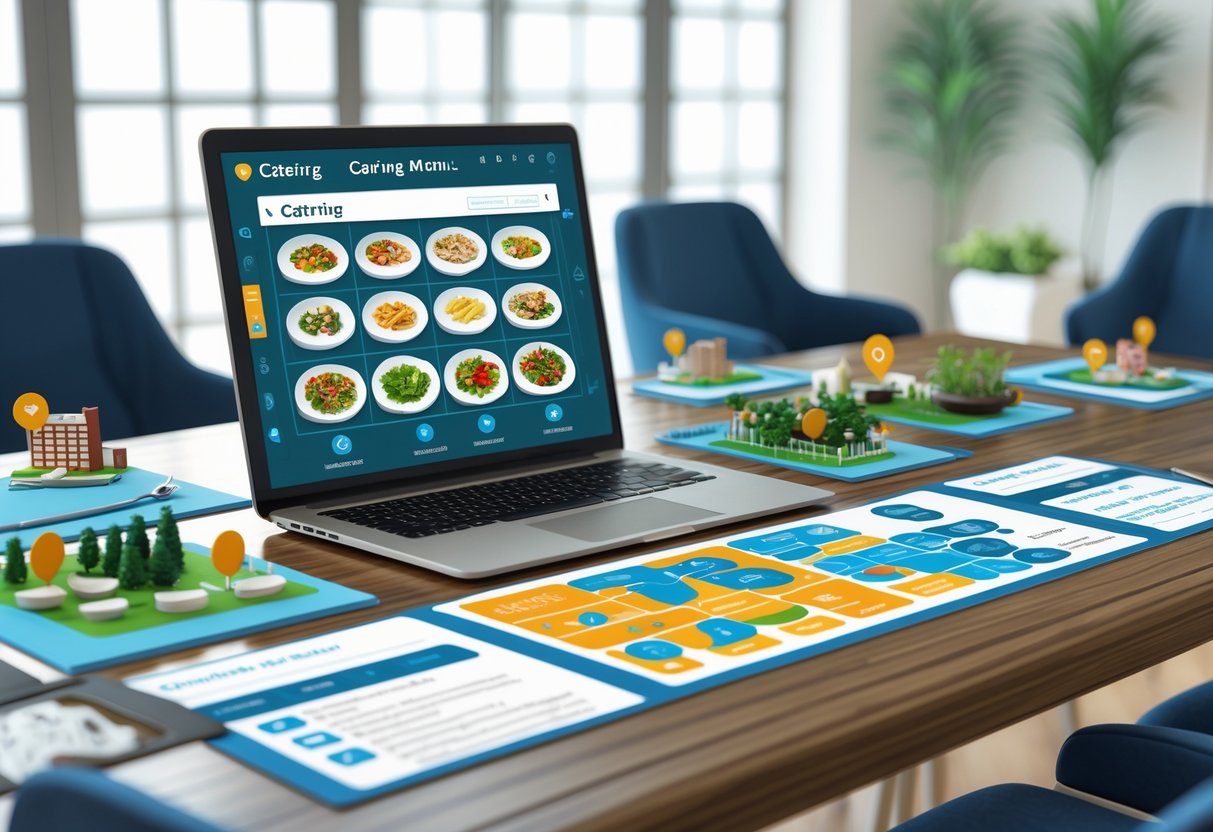
Food and drink can really make or break your event, both for guest happiness and your budget. You’ll need to decide between in-house and outside caterers, cover dietary flexibility, and get clear on beverage policies and pricing.
In-House vs. External Catering
Many venues push their own in-house catering services as the main option. That usually means easier coordination and sometimes lower costs.
In-house catering comes with set menus and not much room for customisation. The venue handles food prep, service staff, and cleanup.
External catering gives you more choice and flexibility with food styles. But venues might tack on extra fees for bringing in outside caterers.
Some venues require outside caterers to have certain insurance or certifications. Others limit kitchen access or charge for using their facilities.
Package deals can save you money if you bundle catering with venue hire. These might include:
- All-inclusive options with food, service, and equipment
- Discounts for booking multiple services
- Easier billing and coordination
Always ask for a tasting session before you commit. That way you know what you’re getting and can tweak the menu if needed.
Dietary Needs and Flexibility
Event planning today means handling all sorts of dietary restrictions. Most pro caterers can do vegetarian, vegan, and gluten-free without blinking.
Essential dietary questions:
- Can you handle food allergies and intolerances?
- How do you prevent cross-contamination?
- Do special dietary meals cost extra?
- When do you need the final headcount for special diets?
Menu customisation ranges wildly by venue. Some let you tweak everything. Others barely budge on set menus.
Think about who’s coming. Corporate crowds often need more dietary options than casual get-togethers.
Serving styles affect cost and flexibility:
- Buffet service offers variety, but allergies can be a worry
- Plated meals give better portion control and separation
- Food stations let guests pick what they want
Write down all dietary needs clearly when you book. Last-minute changes usually cost extra or might not be possible at all.
Beverage Services
Beverage policies can change your event’s cost and the guest experience in a big way. Most venues offer a few alcohol service options with different price tags.
Common beverage arrangements:
- Open bar: All-you-can-drink for a set time
- Cash bar: Guests pay for their own drinks
- Limited bar: Wine and beer only, or a short list of drinks
- Consumption bar: You pay for what gets served
Pricing models can be all over the place:
- Per-person packages for a set time
- Pay for what’s actually poured
- Corkage fees if you bring your own alcohol
- Service charges and tips
A lot of venues ban outside alcohol or charge high corkage fees—sometimes £15-30 per bottle, even more at fancy places.
Licensing requirements control when and what you can serve. Some venues have to stop serving at set times because of their licence.
Don’t forget non-alcoholic options. Make sure venues offer good soft drinks, juice, coffee, and tea all day.
Always double-check what’s actually included in beverage packages. Some skip premium spirits or champagne, which can leave you with surprise costs.
Audio-Visual and Technical Facilities
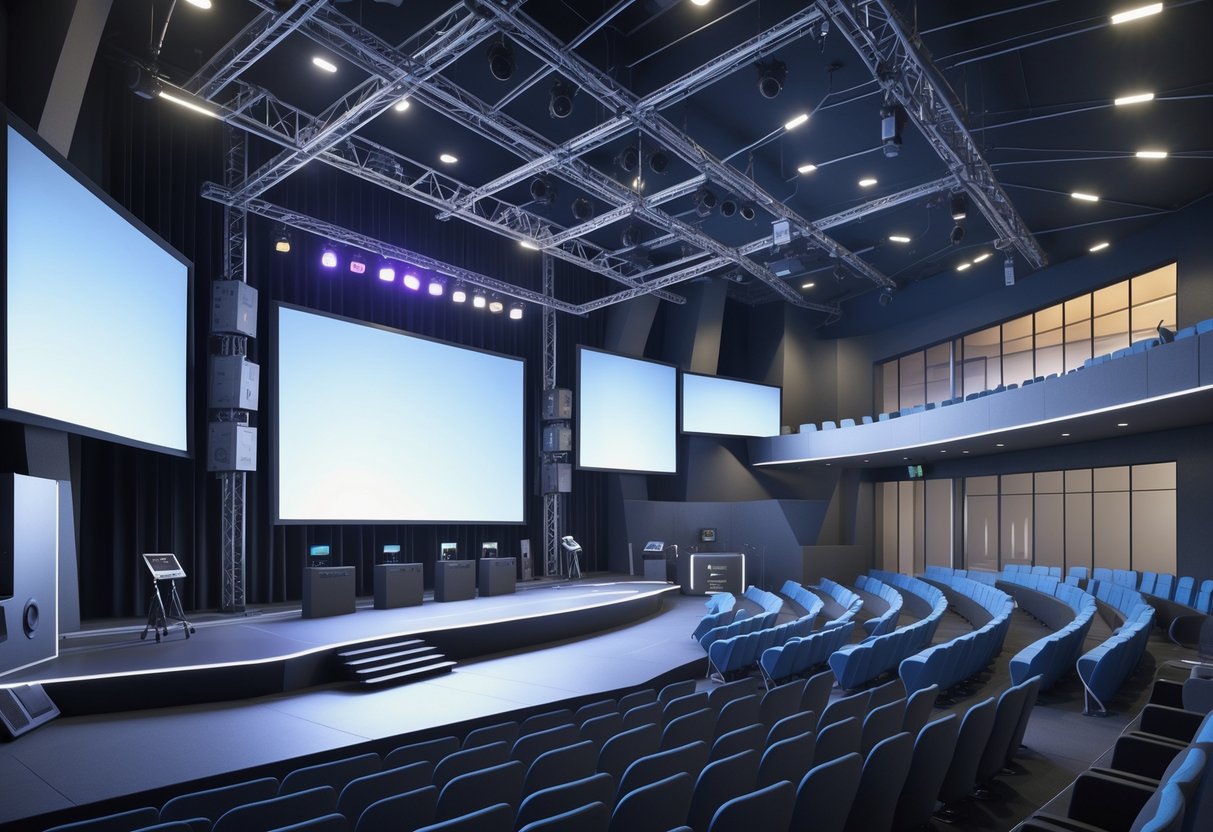
A solid audio-visual setup can make your event shine—or totally flop. Bad sound quality, unreliable internet, or weak lighting can frustrate guests and really hurt your reputation.
Audio-Visual Equipment Availability
Check what AV equipment the venue actually provides before you sign anything. Lots of places offer basic projectors, screens, and sound systems, but the quality can be all over the map.
Essential equipment to check:
- Microphones (wireless handheld, lapel, and headset)
- Sound systems that cover your audience size
- Projectors bright enough for the room
- Screens that everyone can see
- Mixing desks for audio control
- Lighting systems for presentations
Test everything during your venue tour. Built-in systems sometimes fall short for professional events. Some venues block outside AV companies, so get their policies in writing early.
Ask if they have backup gear on-site. Tech fails happen, and having a spare mic or projector can save the day.
If the venue’s equipment doesn’t cut it, bring in outside AV pros. They show up with better gear and know how to fix problems fast.
Internet Connectivity
You can’t run a modern event without reliable internet. Test speeds throughout the venue, not just in one spot.
Key connectivity requirements:
- Minimum speeds: 10 Mbps download per 100 guests for basics
- Live streaming: 50+ Mbps upload for smooth broadcasts
- Multiple access points: Wi-Fi everywhere guests go
- Wired connections: For critical presentations or streaming
Venues often oversell their internet. Ask about bandwidth during peak use and whether you’ll share with other events.
Request dedicated bandwidth if you’re hosting virtual guests or live streaming. Shared Wi-Fi often crashes when too many people connect.
Have a backup plan just in case. Mobile hotspots or portable Wi-Fi can save you if the venue’s internet tanks.
Lighting and Power Supply
Good lighting affects both what people see and how the space feels. You also need enough power for everything to work safely.
Lighting considerations:
- Natural light control: Blackout curtains or blinds for screens
- Adjustable artificial lighting: Dimmable for different moods
- Stage lighting: Spotlights for speakers and performers
- Emergency lighting: So exits are always clear
Power demands can easily outstrip what venues provide. Add up your total electrical load, including AV, catering, and charging stations.
Check where the sockets are and what type they are. Sometimes you’ll need extension leads, but be careful about trip hazards.
Ask about backup power. Generators or uninterruptible power supplies can keep things running if there’s a blackout.
Bring in a licensed electrician for complicated setups. They’ll make sure everything’s installed safely and meets local codes.
Event Support and Staffing
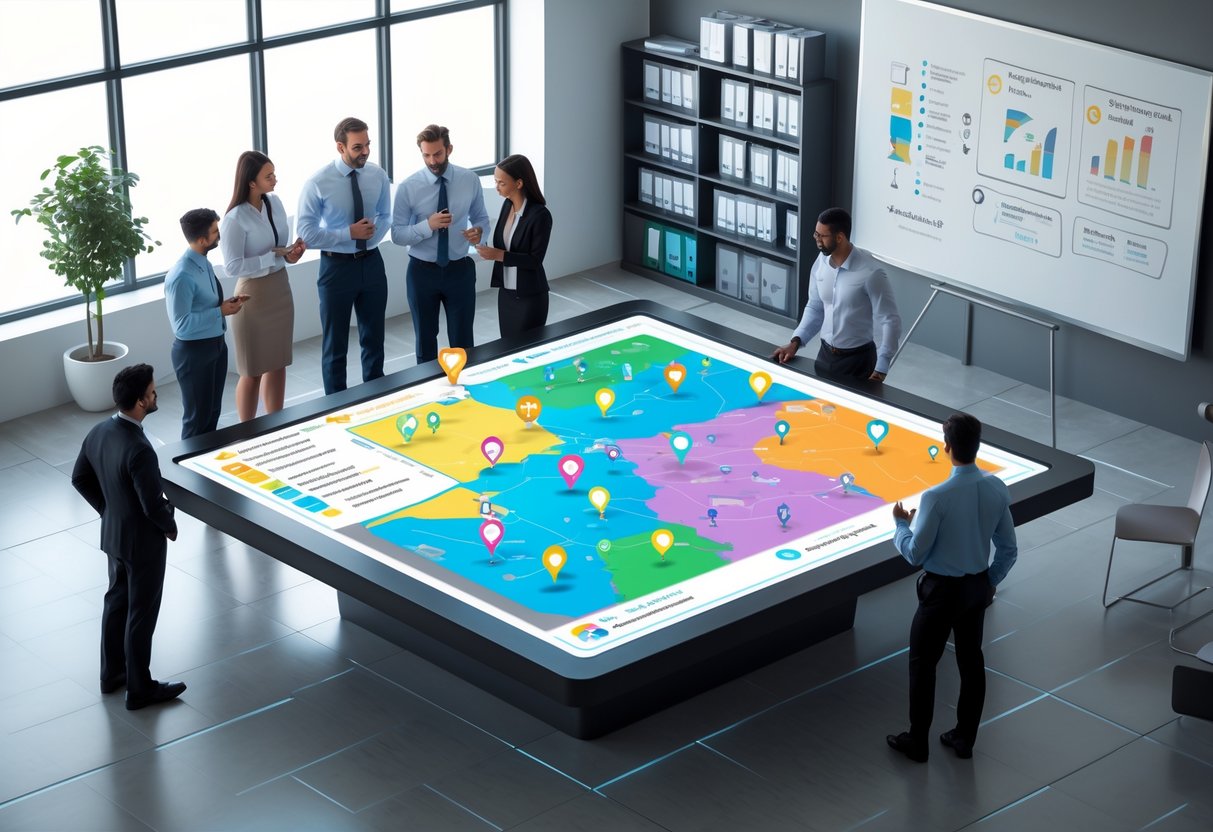
The support you get from the venue staff can make a huge difference. Good on-site coordination, reliable setup help, and solid security measures keep your event running smoothly and take a lot of stress off your plate.
Onsite Coordination
Most venues assign an event manager to oversee your function. This person becomes your main contact for day-of logistics.
A good venue coordinator handles vendor access and manages timelines. They troubleshoot problems as they come up.
They know the building’s quirks and fix issues quickly.
Ask these questions during venue visits:
- Will we have a dedicated coordinator on event day?
- How many events do they manage at once?
- What’s their communication process during the event?
Some venues charge extra for dedicated coordination. Others include basic support but limit availability during peak hours.
Warning: Venues without on-site support leave event management entirely to you. Experienced planners might handle this, but first-timers could feel overwhelmed.
Budget venues often share coordinators between multiple events. This saves money but means you might get less personal attention when something goes wrong.
Set-Up and Clean-Up Services
Venue set-up services really vary. Some places provide full-service teams, while others just handle basic table arrangements.
Full-service venues take care of table layouts and lighting adjustments. Their staff know the space and work fast.
Typical set-up services include:
- Table and chair arrangement
- Linen placement
- Basic décor installation
- Sound system setup
- Lighting adjustments
Many venues ask you to use their preferred suppliers for complex installations. This ensures everything works together, but it does limit your choices.
Clean-up policies are all over the place. Premium venues handle everything after your event ends.
Budget spots might charge extra for cleaning or make you restore the original layout.
Quick tip: Get set-up and clean-up terms in writing. Verbal agreements can turn into surprise charges later.
Some venues offer partial services. They’ll set up tables, but you have to handle decorations and equipment.
Security Measures
Event security protects your guests, equipment, and venue property. Professional venues provide trained security staff who know how to manage crowds.
Basic security covers monitoring entry points and handling disturbances. Enhanced services include equipment protection and emergency response.
Standard security features:
- Controlled access points
- CCTV monitoring
- Emergency evacuation procedures
- Incident reporting systems
Large events usually need extra security beyond venue staff. Many places have preferred security companies familiar with the building.
Venues in city centres often need stronger security because of higher crime rates. Suburban venues may focus more on access control.
Check insurance requirements carefully. Some venues require specific security levels for certain event types. Wedding receptions need different coverage than corporate conferences.
Event planners should check security credentials and training. Untrained security staff can make things worse instead of better.
Contractual Terms and Policies

Venue contracts protect both parties and set expectations for your esports event. Payment schedules, cancellation policies, and insurance requirements directly affect your event budget and risk.
Booking and Payment Terms
Most venues ask for a deposit to secure your date. This usually ranges from 25% to 50% of the total venue cost.
Payment schedules can differ a lot. Some want full payment 30 days before your event, while others offer instalment plans over several months.
Common payment structures include:
- Initial deposit when you sign the contract
- Second payment 60-90 days before the event
- Final balance 14-30 days prior
Try to negotiate payment terms that match your cash flow. If you’re crowdfunding or waiting for sponsors, ask for extended payment schedules.
Watch for extra costs like service charges, cleaning fees, or equipment rental. These can add 15-20% to your quoted price.
Some venues charge overtime fees if your event runs late. Esports tournaments often go over, so negotiate buffer time or flat-rate overtime costs in advance.
Cancellation and Refunds
Cancellation policies decide how much money you lose if you need to cancel your event. Most venues use sliding scale refunds based on when you cancel.
Typical cancellation structures:
- 90+ days before event: 75-100% refund
- 60-89 days: 50-75% refund
- 30-59 days: 25-50% refund
- Less than 30 days: No refund
Negotiate “force majeure” clauses for unforeseeable events. Recent years have shown how crucial pandemic-related protection can be.
Some venues allow date transfers instead of outright cancellations. This lets you keep your deposit and reschedule.
Always clarify if deposits are refundable and under what conditions. Some venues keep booking deposits no matter when you cancel.
Insurance and Liability
Venue contracts usually require organisers to carry liability insurance. This protects against accidents, property damage, or injuries during your event.
Standard insurance requirements include:
- General liability coverage (£1-5 million)
- Property damage protection
- Public liability for attendees
Many venues want to be listed as “additional insured” on your policy. This extends your coverage to protect them from claims related to your event.
Equipment insurance is a must for esports events. Gaming PCs, monitors, and streaming gear are valuable and need coverage.
Some venues offer their own insurance but charge you for it. Compare costs between their policy and getting your own.
Professional indemnity insurance might be required if you charge admission or prize money. This covers claims related to tournament organisation and prize payouts.
Review liability limits in venue contracts. Some venues try to shift all responsibility to organisers, even for venue issues like faulty wiring.
Special Requirements for Corporate Events
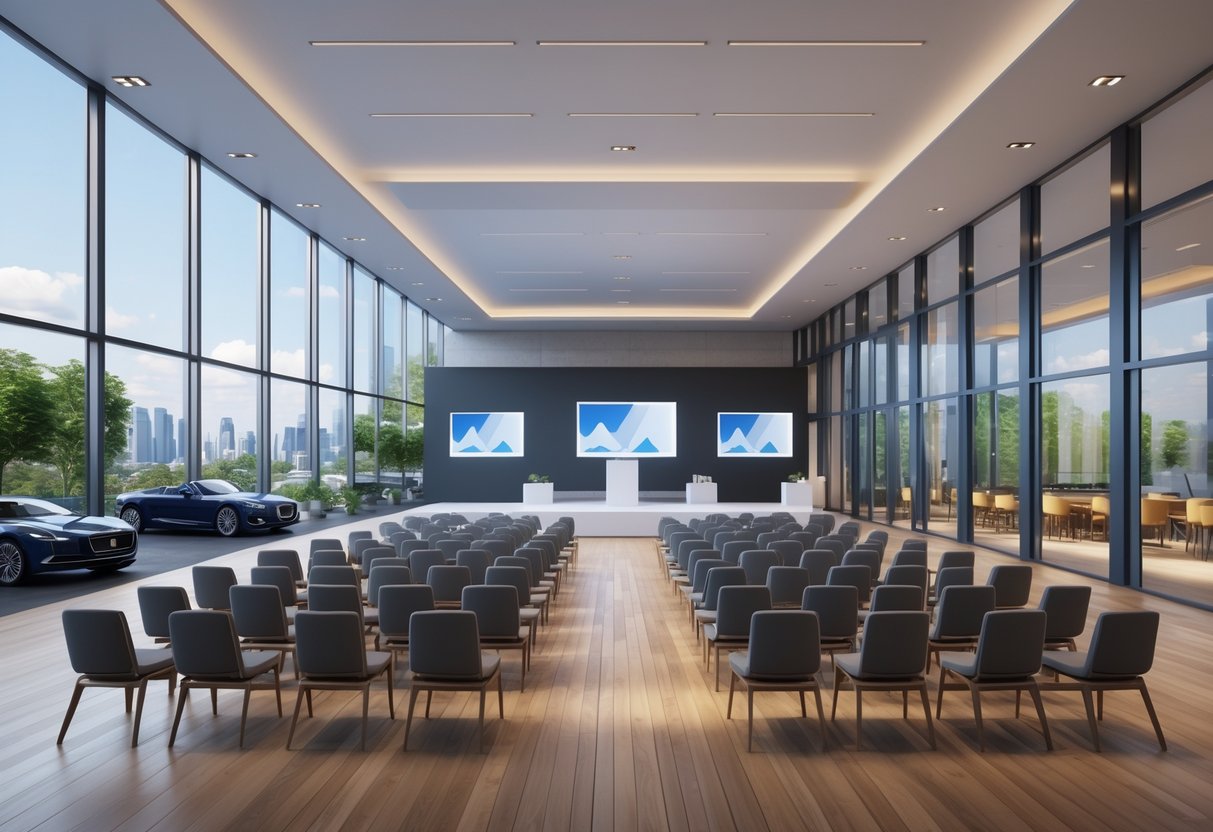
Corporate events need more than just basic meeting spaces. Companies look for branding opportunities, secure environments for sensitive talks, and strong business support.
Branding and Customisation
Corporate venues should offer flexible branding options that fit your company’s image. Many provide digital displays, space for custom signage, and branded entrance areas.
Pick venues with neutral décor that won’t clash with your brand colours. White or beige walls work best for projecting logos and presentations.
Key branding features to request:
- Customisable digital screens for logos or messages
- Removable or coverable existing branding
- Professional lighting for photos
- Backdrop areas for company photos
Some venues charge extra for branding changes. Expect to budget £200-500 for basic customisation at most corporate venues.
Ask about restrictions early. Many venues limit where you can put signage or require professional installers.
Confidentiality and Privacy
Business discussions often involve sensitive info, so you’ll want secure venues. Private meeting spaces keep conversations safe from competitors or eavesdroppers.
Choose venues with solid walls instead of glass partitions. Sound-proofing stops conversations from leaking into nearby rooms.
Essential privacy features:
- Separate entrances to avoid other events
- Controlled access with security systems
- No shared spaces during your event
- Staff confidentiality agreements available
Ask about other bookings on your event date. Competitors might be using the same venue at the same time.
Many corporate venues offer security for executive meetings. This usually costs £150-300 per day for basic coverage.
Business Support Services
Professional corporate events need technical and admin support that standard venues might skip. Planners want reliable partners who get business needs.
Look for venues with dedicated corporate event coordinators. These staff members manage technical setup, catering, and last-minute changes.
Critical business support services:
- On-site technical support for presentations
- High-speed internet with backup
- Professional catering with dietary options
- Admin support for registration and materials
Many venues give you access to event planning software. This helps track attendees, dietary needs, and special requests.
Business amenities checklist:
- Printing and copying facilities
- Video conferencing equipment
- Breakout rooms
- Coat storage and security
Budget for extra support services. Professional venues often charge £50-100 per hour for dedicated coordinator time.
Frequently Asked Questions
Choosing the right venue means balancing practical needs with your budget. These questions tackle the main decisions every planner faces when looking at spaces.
What are the key factors to consider when choosing a venue for an event?
Start with your budget, guest capacity, and location accessibility. These three basics matter most.
Timing is just as important as space. Check availability for your dates early—popular venues book up fast.
Look at what the venue includes versus what you’ll need to hire. Tables, chairs, sound systems, and catering facilities can really affect your total costs.
How does the type of event influence the selection of a venue?
Corporate events need presentation equipment, solid Wi-Fi, and a professional vibe. Wedding venues should be flexible for decorations and offer longer rentals.
Gaming tournaments and esports events need great internet, plenty of power outlets, and good climate control for electronics. The layout should separate spectators from competitors.
Conference spaces work best with multiple rooms for breakout sessions. Social gatherings care more about atmosphere and entertainment than tech.
What should one look for in a venue to ensure it meets the event requirements?
Go visit the venue in person. Photos can mislead you about size and flow.
Test the Wi-Fi speed and check mobile signal throughout the space. Bad connectivity can ruin an event.
Check parking and public transport links. If guests can’t get there easily, attendance drops.
Why is the location of a venue crucial for the success of an event?
Accessible locations boost attendance, especially for evening events. If a venue is hard to reach, guests might not bother.
Think about your audience’s travel habits. City centre venues work for business events, while countryside spots suit weddings but might be tough for older guests.
Transport costs matter. Pick locations that don’t force guests into expensive taxis or long journeys.
What are the considerations for the capacity and layout in venue selection?
Match the space to your guest count. Rooms that are too big feel empty, and overcrowded spaces create safety issues.
Check the venue’s maximum capacity according to fire safety rules. That number is often lower than what feels comfortable.
Think about different areas for different activities. Reception, dining, and entertainment zones each need the right size for smooth guest flow.
How do you assess the amenities and facilities provided by a potential event venue?
Start by jotting down a checklist of the must-have items before you even step foot inside. Pay attention to which amenities come with the base price and which ones sneak in as extra charges.
When you visit, actually try out the equipment. Don’t just look at the sound systems, projectors, and lighting—ask them to show you how everything works.
Bring up staffing support while you’re there. Some venues offer technical help and coordination during your event, but others might expect you to handle it all.

